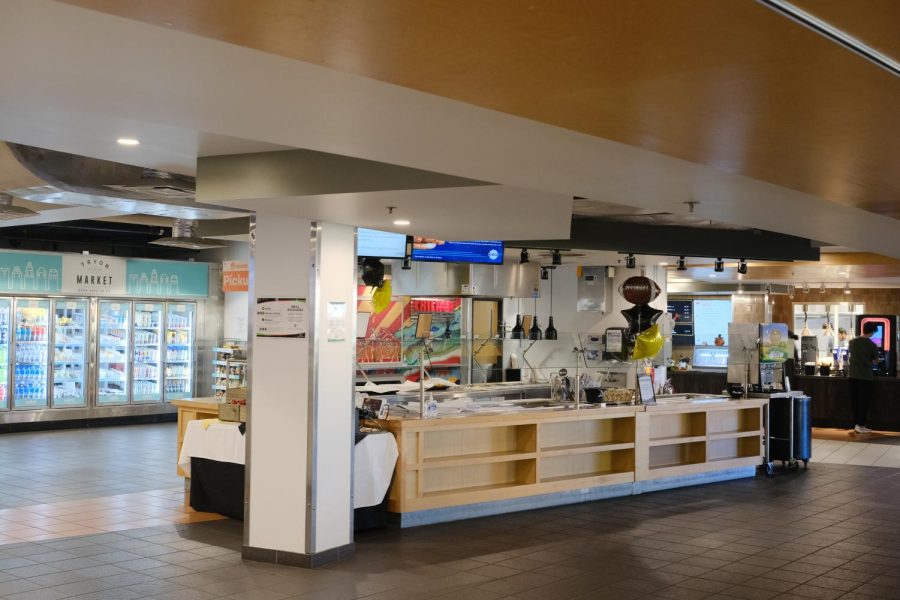Campus food recovery efforts combat waste, promote sustainability
November 1, 2022
You might’ve seen them: videos of hundreds of donuts, chicken nuggets, bagels and other food items being thrown into bins by reluctant service workers. Restaurants like Dunkin’ Donuts, Chick-fil-A and Starbucks are skewered online by critics of food waste. But what might food waste look like on a college campus, and who are the groups addressing good food being thrown away?
Enter May Jagodzinski, a fourth-year environmental science and global health major at UW-Madison, and the co-president of Food Recovery Network-Madison (FRN-Madison), a student group recovering food from school dining halls and serving it to the larger campus community.
FRN-Madison is a chapter of Food Recovery Network, whose about page describes themselves as the “largest student-led movement fighting food waste and working to end hunger in America,” Jagodzinski said. FRN-Madison re-established itself as the COVID-19 pandemic died down and that it looks “totally different from when it started in 2016.”
FRN-Madison offers meals twice a week. On the night prior to their meal nights, they receive emails from a dining hall coordinator detailing which dining halls have extra food; the next day, volunteers drive rented UW-Madison Fleet vans to dining halls and recover cooked food. The meals are served to UW-Madison students and staff at The Crossing, a non-denominational church on University Avenue, where volunteers ensure the foods’ safety and warm it up. Jagodzinski said logistics can be complicated, especially as volunteers are unpaid, but that getting a game plan in place can help make operations smoother.
“I really like the community component [of volunteering],” Jagodzinski said. “I just enjoy working with all kinds of different people.”
Jagodzinski said being able to interact with graduate students, who comprise much of FRN-Madison’s diners, and work with other campus organizations, such as pre-health organizations, is one of her favorite things about FRN-Madison.
According to the USDA, between 30-40% of the nation’s food supply becomes food waste; in 2010, this correlated to 133 billion pounds of food going to waste, a $161 billion value. The production of this food is a resource-intensive process contributing to land, water and energy use, among others, with the resulting food often ending up in landfills instead of on kitchen tables.
Although UW Oshkosh does not currently have a specific food recovery student organization, assistant dining director Brian Warzynski said that at staff break times, food is donated to Father Carr’s Place 2B, a local Catholic ministry and volunteer organization, with retail food being donated to The Cabinet during the springtime. Warzynski also noted that Aladdin Campus Dining employs batch cooking to reduce waste.
“As food and labor become more and more expensive it is vital to keep waste to a minimum,” Warzynski said. “Aladdin has processes in place to either reuse some of the food in different ways, or if items can’t be [reused] they put them in the campus biodigester instead of the garbage disposal.”
Brian Langolf, the director of UWO’s Biogas program, said that leftover food is collected biweekly from Reeve Student Union and Blackhawk Dining Hall by the Biogas Program and Green Fund Organics Collection. UW Oshkosh currently employs a biodigester that converts food waste into electricity; according to Biogas Systems’ website, its facility produces approximately 8% of UWO’s electricity needs, with over 10,000 tons of yard and food waste consumed per year.
Bradley Spanbauer, sustainability director at the UWO Sustainability Institute for Regional Transformations, said that issues with prepared food waste can be hard to solve. Spanbauer noted that consumption trends are hard to guess and food packaging options have to be selected to be compostable.
“Often the ‘depackaging’ takes more time and effort than some are willing to give to better handle their food waste,” Spanbauer said. “So one option would be to emphasize made to order instead of ready to eat.”
To reduce unsustainable dining, Spanbauer said students should be mindful of how much they plan to eat prior to ordering and utilize reusable utensils and containers.
Jagodzinski urged students to reach out to the Food Recovery Network if they wish to start a chapter at UWO. She said that students should plan to coordinate volunteers, drop-off or meal preparation locations, and other logistical elements, if they wish to start a chapter.
“It’s a really important thing to keep going on our campus,” said Jagodzinski.














